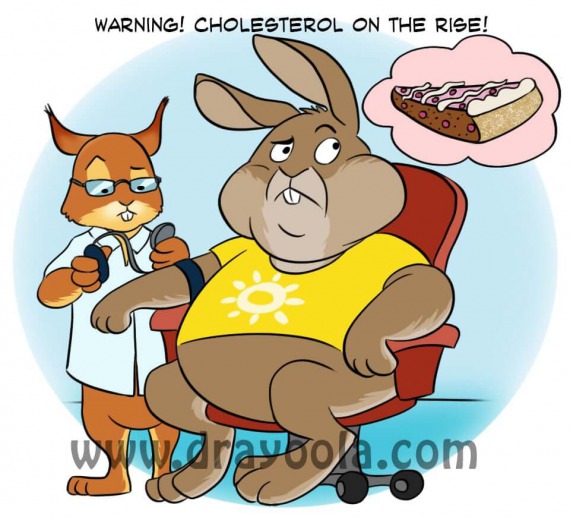It might surprise you that cholesterol itself isn’t bad. In fact, cholesterol is actually created and used in our bodies to keep us healthy.
So, why does this substance get such a bad rep? It might be helpful to better understand what it is so we can better distinguish its good, bad and ugly aspects.
Cholesterol is a waxy, fat-like substance found in every cell in our body. Our bodies need it for a variety of functions such as: repairing cell membranes, manufacturing vitamin D in the skin, producing hormones, and possibly helping cell connections in the brain that are important for learning and memory. Our bodies (particularly the liver) make all the cholesterol that we need. Cholesterol is also easily found in the food that we eat, particularly animal sources that contain saturated fat such as meat, poultry and full-fat dairy products. It cannot dissolve in the blood, so it has to be transported through your bloodstream by carriers. And this is when problems can occur. If there is too much in your blood stream it can build in the walls of your arteries. Over time, this buildup causes your arteries to narrow and blood flow to the heart is slowed or blocked. The blood carries oxygen to the heart through the arteries – which can cause heart attacks.
High cholesterol is a condition that can often sneak up on you. There are usually no symptoms associated with it, yet it could bring fatal consequences if left ignored. There are many factors that can cause your levels to go out of range in your blood. In some cases, it is genetic disposition and relatively out of your control. In those cases, you should speak with your healthcare provider and find an appropriate treatment plan. But often times, high cholesterol is the result of unhealthy lifestyle choices and in such cases it is readily treated and cured.
The best way to achieve healthy cholesterol levels are:
Losing Weight
Extra weight and inactivity can also contribute to high cholesterol. Losing even 5 to 10 pounds can help significantly lower your levels. And a great way to drop any extra weight is by regular exercise. Exercise is essential for your body. When your active, your heart becomes stronger and it helps clean out your arteries. Try to be as active as you can. If all you can do is 10 minutes, that’s ok! A little exercise is better than none.
Healthy Eating
GOOD FOODS for your cholesterol levels are:
- avocado
- oatmeal
- oat bran
- whole-grain products
- olive oil
- fish and omega-3 fatty acids
- walnuts and almonds (and other nuts)
- fruits and vegetables
BAD FOODS for your cholesterol levels are:
- red meat
- organ meats
- cheese
- butter and other full-fat dairy products
- excess salt
- hydrogenated / manufactured oils
You don’t have to avoid these foods, just limit them. Moderation is key! Anything containing trans fat are particularly bad, such as: most margarine and store bought cookies, crackers and cakes. Check your food labels and try to avoid trans fat (partially hydrogenated oils are trans fats!).
Lifestyle Factors
A few other factors that could play a role in elevating cholesterol are: smoking, lack of activity, being under high stress and excessive alcohol consumption.
If your cholesterol is normal, you should focus on prevention. Keeping your cholesterol levels healthy is a great way to keep your heart healthy. Lifestyle, lifestyle, lifestyle! Those everyday decisions are what make or break you: oatmeal for breakfast or fast food? Workout or watch tv? Dr Pepper or water?… every decision counts towards or against your health.
How will you choose to live?
Learn more about Dr. Ayoola and Weight Loss Specialists of North Texas


